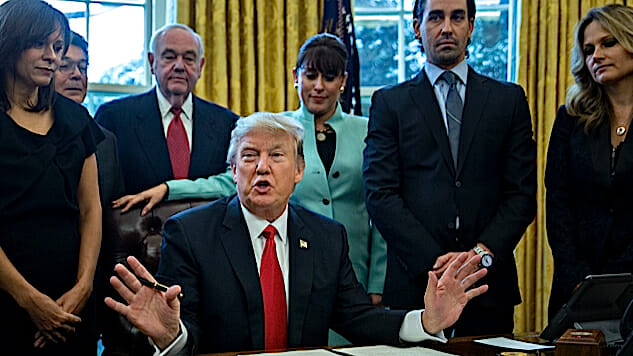Introducing Endless Mode: A New Games & Anime Site from Paste
President Donald Trump, with the backing of a substantial portion of Congressional Republicans, is threatening to eliminate the filibuster for Supreme Court nominees. This rule change, commonly referred to as the “nuclear option,” would eliminate the supermajority requirement for Supreme Court justices. In the immediate future, it would deprive Democrats of the opportunity to block the “far-right Supreme Court nominee President Trump is expected to announce next week.
Senate Minority Leader Chuck Schumer had previously stated “if the candidate’s out of the mainstream, I can tell you I will fight and my caucus will fight tooth and nail against them.” However, if Donald Trump gets his way, the hypothetical fight may never happen. Asked if he would advise Senate Republicans to employ the nuclear option, Trump replied: “I would. We have obstructionists,” apparently oblivious to the irony that he belongs to a party that took obstruction to a whole new level in the Obama years.
At any rate, if a simple majority of Senate Republicans opt to remove the filibuster, Trump will require 50, as opposed to 60 votes, to seat a Supreme Court justice, depriving Democrats of any leverage whatsoever. It remains to be seen whether Senate Majority Leader Mitch McConnell, by some accounts a staunch guardian of Senate procedure, would consent to such a drastic rules change. However, given Republicans’ repeated willingness to reverse themselves on matters of principle since capturing the presidency, Democrats should not count on a favorable outcome.
Republicans’ legislative gambit would be particularly galling in light of their year-long refusal to so much as hold a hearing for Merrick Garland, President Obama’s nominee to replace the late Antonin Scalia. Faced with the prospect of the most liberal court in a generation, Republicans constructed out of whole cloth the self-serving argument that President Obama should not be able to fill a vacant Supreme Court seat so close to a presidential election. As Patrick J. Leahy, Democrat of Vermont, aptly put it, “when they had a consensus person with Merrick Garland, every single Republican who raised their hand and solemnly swore before God to uphold the Constitution refused to follow the Constitution and even have a hearing.” Let the people decide (apparently 2012 didn’t count), insisted a Republican Party otherwise dedicated to thwarting democracy.
The American people decided; they chose Hillary Clinton by a margin of 2.9 million votes, but the Electoral College delivered the presidency—and the presidential prerogative to nominate Supreme Court justices—to Donald Trump. After arguably violating the spirit, if not the letter of the Constitution by obstructing Merrick Garland, Republicans are considering changing Senate rules to ram through a reactionary ideologue without advice or consent from Democrats.
Although the parliamentary maneuverings of the legislative branch pertaining to the Supreme Court don’t make for as much excitement as, say, Trump’s latest tweetstorms, Sean Spicer’s daily servings of lies or Kellyanne Conway’s latest “alternative facts,” the stakes could not be higher. In the coming years, the Supreme Court will hear cases on issues including but not limited to voting rights, environmental regulations, campaign finance, gun control, LGBT rights and reproductive rights.
And by extension, we must care about how Supreme Court justices are selected. The consequences of eliminating the filibuster stretch beyond the current political moment. Without opposition to offer its advice and consent, nominees to the Supreme Court are likely to be more ideologically extreme and/or crassly political. This will only serve to further undermine public trust in the Supreme Court as an institution.
The legitimacy of American government is a fragile thing, bound up in an intangible web of norms and beliefs that confer legitimacy upon it. Republicans, particularly those who fancy themselves Constitutional conservatives, would do well to consider the implications of eliminating one of the last legislative inducements to bipartisanship that remains, especially at a time when they lack a substantial mandate. Should they choose to place short-term interest ahead of the long-term health of the Supreme Court, they will increase the polarization that is tearing the nation apart and perhaps ignite a Constitutional crisis. Or, they may have to sit idly by as a future Democratic president stacks the Supreme Court with progressive, aka “activist judges.” When it comes to major rules changes, what goes around comes around.
